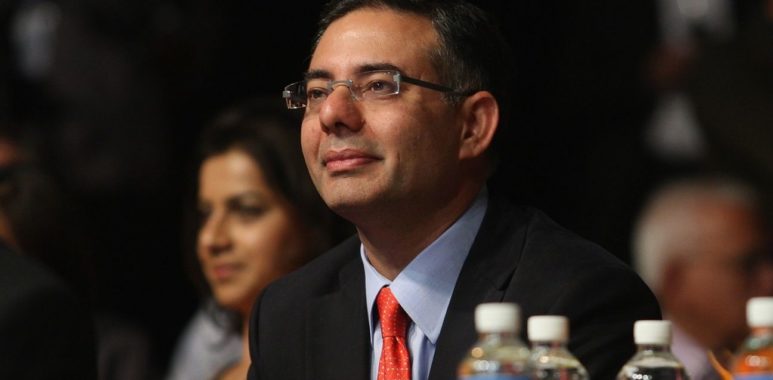
BCCI upset with ICC for overlooking objections to new events in 2023-31 cycle
The BCCI has reacted angrily to the ICC for bypassing the strong objections raised by the Indian board along with the ECB over the future set of events in the 2023-31 rights cycle. The divide is set to come out in open at the March ICC meetings, scheduled in Dubai, which is likely to be attended by the top brass of the BCCI.
Last week, the ICC had sent out an email asking all members, including Associates, to tender their expressions of interest for hosting any of the 20 global events in men’s and women’s cricket which form part of the 2023-31 cycle. That email came on the heels of ICC chief executive officer Manu Sawhney visiting several countries – both Full Members and Associates – to explain the details of the process model and the bidding process which would determine the hosts for the events. Although Sawhney visited all the major cricketing countries including England, New Zealand, Pakistan, South Africa, and Zimbabwe, missing from that list was India.
On its part, the BCCI is annoyed that the ICC opted to overlook the strong reservations the Indian board had expressed last October. Back then, the BCCI’s chief executive officer Rahul Johri had written to Sawhney, saying there would be “wide ranging repercussions on bilateral cricket” in case the ICC went ahead with its decision.
ALSO READ: T20 ‘Champions Cup’ part of ICC events for 2023-2031
Johri had also pointed out that it would be prudent to wait for an elected BCCI administration to take the final call on the matter.
For its part, the ICC has stressed that the proposed set of events had been given the go-ahead from the ICC board in the October meetings. Incidentally, the BCCI representative at that ICC board meeting was Amitabh Choudhury, the acting secretary at the time, who attended the meeting without the approval of the Committee of Administrators, the Indian board’s supervisory authority at the time. The ICC allowed Choudhury to sit at the meeting even though he did not give consent or object to any of the resolutions, saying the appropriate authority would be the elected BCCI administration.
The BCCI remains adamant that bilateral series need to be worked out before the ICC events are finalised. “We are very clear on that,” a senior voice in the BCCI said. “Suppose if the important boards don’t file any expression of interest, then… will ICC plan events on its own? By planning ICC event every year, it doesn’t work for world cricket actually. The ICC needs to understand this. Bilaterals are more important. It will affect IPL, Big Bash, bilaterals – there will be no window. And how much can the players play?”
Holding a global event every year, this official said, would also potentially reduce the “value” and prestige attached to winning a World Cup.
“You lose the charm of winning the World Cup if you are planning to host it every year. Too much of something is not good. When you win a World Cup you look to the next one four years later, but if you host a world event every year then you could lose value of that tournament.”
As for the argument that smaller boards, which don’t have the luxury of a fat broadcasting revenue that the BCCI enjoys, can benefit from the extra revenues ICC can accrue by hosting eight global events in the next cycle, the BCCI official disagreed. “Look, have these smaller countries got better from the existing ICC revenue model? They are suffering.”
This official said that for the BCCI, the majority of its revenues come from bilateral cricket. If that is affected, then it will suffer. “After all, how many broadcasters do you have? How much money can they put into all cricket?”
Another senior BCCI official argued that if the ICC does go ahead with the eight events, the World Test Championship would be affected too. “The World Test Championship will become a huge challenge. There will be no time for it.”
Nonetheless, the ICC is likely to find support from member boards like Pakistan Cricket Board, Cricket West Indies, Sri Lanka Cricket and Zimbabwe Cricket along with the boards from Ireland and Afghanistan. All these countries have been struggling with their finances in the absence of lucrative broadcast deals. As a chief executive at one of the Full Member boards explained, their challenge has been that while the “costs of the cricket have been going up, the value of bilateral cricket has been going down”. He concurs with the view that smaller boards are struggling to find buyers for their cricket rights.
“BCCI and few other boards want to stick to six events in an eight-year cycle as was the case in the 2015-23. If the BCCI wants to bring in a resolution to object then they should be able to do that within the framework of the rules at the ICC board meeting”
Consequently, a majority of these smaller boards rely on the ICC money that is split from the broadcasting pot. “The ICC have hosted an event year historically with the exception of 2018 when there was no global event,” a senior official from one of the Full Member countries said. “In order for the ICC to give consistent cash flows to the members they need an event every year.”
However, not everyone agrees with the ICC locking horns with the BCCI. One of the officials, who sits on the ICC working group on the future events, said the ICC’s hostile approach towards the BCCI was “unnecessary”. “I don’t understand why they seem to be going against the BCCI and also the ECB. The ICC’s whole approach has been unnecessary. I question that approach. The working group was still running through various options when the ICC went immediately to the board of directors with the proposal.”
According to this official, no authorised person from the BCCI or Colin Graves, the ECB chairman, were present at the October ICC board meetings. He felt a better approach would have been to have further deliberations, which could have been tabled at the March meetings, before arriving at the final call.
The working group member said a full calendar should be agreed on by all parties. “Whether you are playing bilateral or ICC cricket first that doesn’t really matter because until you have looked at the entire calendar. Then you juggle around events and remain flexible to strike the right balance. So to ink in the ICC events without even discussing or considering bilateral cricket is not appropriate.”
Despite the BCCI and the ICC not seeing eye-to-eye at the moment, a key person who sits on the ICC board said the two bodies can work out their differences amicably during the March round of meetings in Dubai.
This person said that the BCCI has not backed the ICC plan only because it is comfortable with the set of events in the current cycle. He said the same applies to some of other bigger boards like the ECB and CA. “BCCI and few other boards want to stick to six events in an eight-year cycle as was the case in the 2015-23. If the BCCI wants to bring in a resolution to object then they should be able to do that within the framework of the rules at the ICC board meeting.”

